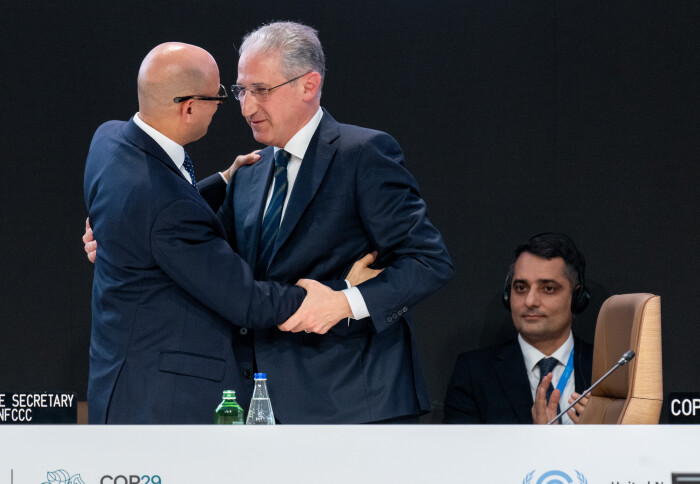COP29's $300bn climate pledge a 'disappointingly small step in right direction'

COP29 president Mukhtar Babayev and Executive Secretary of the UNFCC Simon Stiell at the closing plenary. Image by Vugar Ibadov.
Rich countries will ramp up their contributions to help poor countries deal with climate change to $300 billion by 2035, COP29 agreed on Sunday.
The deal was announced at 3.00am Azerbaijan time (11pm UK), after stop-start negotiations ran more than 35 hours overtime at the two-week climate change conference.
Dubbed the ‘finance COP,’ the focus of COP29 was deciding how much money should be funnelled to poorer countries to help them move away from fossil fuels and adapt to worsening extreme weather.
Mr Michael Wilkins, who attended COP29 and is an Executive Director and Professor of Practice at the Centre for Climate Finance and Investment at Imperial, says the new finance goal is a “a disappointingly small step, but one in the right direction.”
Ahead of the summit, researchers recommended that at least US$1 trillion of climate finance should be mobilised each year by 2030.
During COP29, developing countries argued the finance goal is a matter of historic responsibility obligation – wealthy developed countries have created the largest share of global carbon emissions and benefited from extracting and selling fossil fuels, which are the main cause of climate change.
Meanwhile, poorer countries have contributed a much smaller proportion of emissions and are being pummelled by worsening extreme weather.
The new climate finance goal – called the ‘New Collected Quantified Goal’ in UN jargon – will see current contributions from the purses of developed governments tripled to $300 billion by 2035, with plans for an additional $1 trillion a year to come from other sources, including private investments.
The $300 billion figure was immediately criticised by developing countries, with representatives for India and Nigeria describing it as a “paltry sum” and a “joke.”
However, Mr Wilkins says the deal is better than no deal at all.
“During the final two days it even appeared that the talks would break down in acrimony and there would be no deal struck, leaving the whole UN process is chaos and the world no closer to achieving a meaningful climate solution.
“Yet, as so often happens at COPs, a rabbit was pulled out of the hat at the last minute.
“While the promised public funding falls way short of the trillions of dollars poor and vulnerable nations say they need to climate-proof their economies, it is still a considerable step up from the $100 billion per annum pledged 15 years ago in Copenhagen, a target that only recently has been achieved.”

Transitioning away from fossil fuels
At COP28 in Dubai, nations reached a historic agreement on “transitioning away from fossil fuels.”
The burning of oil, gas and coal is the main cause of climate change, however, last year was the first time a COP text included the words ‘fossil fuels.’
COP agreements consider the perspectives of nearly 200 countries, including petrostates like Azerbaijan and the UAE.
Many countries hoped COP29 would double down on the COP28’s agreement to transition away from fossil fuels. However, little progress was made, with Saudi Arabia the staunchest opponent to direct references to fossil fuels in the final agreement.
Dr Emma Lawrance, who attended COP29 and is the Climate Cares Lead and Mental Health Lead at the Institute of Global Health Innovation, says:
“This COP agreement does not go far enough to accelerate the transition away from fossil fuels and help communities safeguard their health with the climate threats they face.
“Replacing oil, gas and coal with renewable energy can create a more equal, healthier future for the wellbeing of all.”
Fossil fuel use hit an all-time high this year, with emissions up 0.8% to 37.4 billion tonnes compared to 2023, according to the international Global Carbon Project team.

NDCs, 1.5°C and Belém
This year is almost guaranteed to be the hottest on record, the World Meteorological Organisation warned on day one of COP29.
Temperatures are expected to be about 1.5°C above preindustrial levels. The heat has worsened weather disasters around the world, including the floods in Spain, hurricanes in the US and the crippling drought in the Amazon rainforest, research by World Weather Attribution at Imperial has found this year.
In February, countries need to new 2035 emission reduction targets, known as 'Nationally Determined Contributions' or 'NDCs.'
Professor Joeri Rogelj, Director of Research at the Grantham Institute – Climate Change and Environment, Imperial College London, says:
“It’s encouraging to see ambitious new targets from the UK and Mexico, and a commitment by others to make them aligned with the Paris Agreement’s goal of limiting warming to 1.5°C.
“Much has been said about whether limiting warming to 1.5°C is still possible, and the odds are no longer in the world’s favour on this one. However, with every fraction of a degree of warming, life on earth will become much more dangerous.
“It doesn’t matter what the number is. Every country has to deliver emissions reductions that are as deep as they can possibly be.”
COP30 will be hosted next year in Belém, Brazil, a city known as a gateway to the Amazon rainforest.
Protecting nature and achieving the emission reductions outlined in NDCs are expected to be priorities of the summit
Article supporters
Article text (excluding photos or graphics) © Imperial College London.
Photos and graphics subject to third party copyright used with permission or © Imperial College London.
Reporter
Sam Ezra Fraser-Baxter
The Grantham Institute for Climate Change